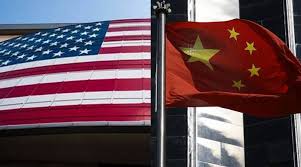These U.S. Businesses Are Most at Risk From a Trade War With China

U.S. companies need to prepare for greater tension between President Donald Trump’s administration and China. Trump plans to impose tariffs on imports of steel and aluminum, including from China, and is said to be considering a broad range of curbs on China imports, from shoes and clothing to tech gadgets. Such moves could prompt retaliation from President Xi Jinping and lead to a Chinese backlash against American businesses. The following are among those most at risk:
1. Boeing
Boeing Co. expects China needs 7,240 new planes valued at almost $ 1.1 trillion in the two decades through 2036. However, if China’s leaders decided to punish American companies, Boeing would be an easy target since the government controls most of the company’s Chinese customers.
2. Starbucks
Chinese consumers angered by Trump could easily target one of the most visible U.S. brands. The timing of a trade dispute could be particularly bad for Starbucks Corp.: The Seattle-based coffee chain recently opened in Shanghai a 30,000-square-foot Starbucks Roastery and Tasting Room, the company’s first outside the U.S. Chairman Howard Schultz said in December China is on course to be the company’s largest market in less than a decade.
3. Westinghouse
Success in China is critical for Westinghouse Electric Co., which filed for bankruptcy in 2017 but hopes this year to connect its next-generation reactor to the Chinese grid. Other countries are more likely to adopt Westinghouse’s technology if the much-delayed Chinese project finally starts operation. In November, CEO Jose Gutierrez said Westinghouse was still waiting for Chinese regulators to approve loading of nuclear fuel.
4. Tesla
A trade war would complicate efforts by Tesla Inc. to expand in China, where it’s already struggling to strike a deal to open a factory. The company led by Elon Musk said in June it was working with the Shanghai government to explore local manufacturing in China, a move that would allow the electric-car maker to achieve economies of scale and bring down manufacturing, labor and shipping costs.
5. Apple and Tech Companies
Apple may have the most to lose if Trump’s tariffs define imported goods as all items produced in China. Top U.S. hardware makers from Intel Corp. to Dell Inc. also rely heavily on manufacturing in China. Apple makes most of its gadgets — including iPhones and iPads — in China via partners such as Hon Hai Precision Industry Co., part of Taiwan’s Foxconn Technology Group. China could also use a new cybersecurity law to create headaches for companies like Amazon.com Inc.
6. Ford
With Ford Motor Co.’s China business struggling (vehicle sales fell 6 percent in 2017) and the company planning more than $ 750 million in co-investments there, the automaker is especially vulnerable to a sudden downturn in U.S.-China relations. To illustrate how quickly Chinese consumers can respond to geopolitical tensions, sales of Hyundai and Kia cars in China plunged following a spat last year between China and South Korea over an antimissile system. Don’t forget General Motors, either; it sells more cars in China than Ford.
7. Agriculture
If China wanted to hit back, soybeans could be a weapon. The U.S. sold $ 13.9 billion to the Asian nation in 2017. While the U.S. counts China as its biggest market for the oilseed used in animal feed, Beijing has a choice of sellers to turn to in the event of a retaliation on U.S. imports. Meat imports are also a potential flashpoint. They were the second-most valuable agricultural trade between the U.S. and China in 2017, worth about $ 1.3 billion. China’s JD.com Inc. has agreed to buy $ 1.2 billion of beef from the Montana Stock Growers Association and pork from Smithfield Foods Inc. as part of a deal by the Chinese online retailer to import $ 2 billion of U.S. goods.
8. Oil & Gas
The shale boom has helped the U.S. challenge Russia and Saudi Arabia as one of the world’s biggest oil producers, and the end of a four-decade ban on crude exports means its supply is sailing to nations across the globe. And China’s welcoming its cargoes more than any other nation. Imports of American oil increased almost 1,500 percent in 2017, with purchases valued at about $ 3.2 billion. China has also been snapping up cargoes of liquefied natural gas and inking long-term supply deals.
9. Finance Companies
China has vowed to open up its finance industry. Might Trump’s actions force the door shut for U.S. finance firms just as it was about to open?
10. China’s U.S. Acquisitions
Trump is said to be looking to toughen rules on Chinese purchases of U.S. firms, such as adding curbs in industries where American businesses do not have reciprocal access to acquiring Chinese counterparts. There has been a spate of Chinese acquisitions in the U.S. in recent years. Among those already facing U.S. scrutiny is HNA Group Co.’s takeover of SkyBridge Capital, the hedge-fund firm of Anthony Scaramucci, who was briefly Trump’s communications director.
